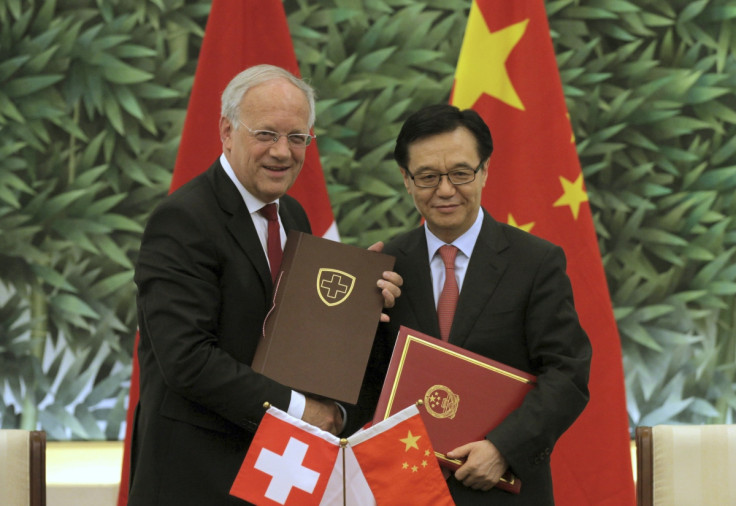Switzerland Becomes First Mainland European Nation to Start Free Trade Agreement with China

Switzerland has become the first mainland European country to enter into a free trade agreement with China.
Officials inaugurated the accord in Switzerland's third city Basel, three years after negotiations kicked off and a year after it was first agreed upon, with bilateral tariffs on goods traded to be cut on a staggered basis over the next 15 years.
Analysts now expect China to overtake Germany as Switzerland's biggest export market by 2035, with the Asian giant's growing consumer goods set to get more affordable access to luxury Swiss goods, such as watches.
China is already the largest buyer of Swiss industrial goods in Asia and third largest worldwide. In 2012, 3.7% of Switzerland's total exports went to China. China provides 5.5% of Switzerland's total imports.
The agreement is wide-reaching, covering everything from trade in goods, to intellectual property protection and alignment of institutional policy.
The Chinese state news agency Xinhua is reporting that 99.7% of Swiss imports from China will be exempt from customs duties, with 84.2% of Swiss exports to China becoming exempt.
"The FTA will enable many Swiss agricultural products with export potential (including dairy products such as cheese, yoghurt, skimmed milk powder and butter, beef jerky, processed products such as chocolate, baby food, biscuits, jams, roasted coffee, confectionery, ice cream, non-alcoholic beverages, wine) to be imported into China tariff-free or at reduced tariffs," said a factsheet on the Swiss government website.
Iceland became the first European country to sign a free trade agreement with China in April 2013. It's significant that neither the first nor second signatory is a member of the EU.
While Switzerland's agreement comes as China-EU trade relations seem to have entered a period of calm, the pair spent years at loggerheads over various trade disputes, amid allegations of dumping and protectionism.
The pair last year settled on a deal over solar panels after years in which Brussels accused Beijing of undercutting the competition. In March this year, China and the EU came to an agreement over perceived Chinese anti-dumping measures on the import of European wine, which were ostensibly issued in response to the EU's measures on China's solar exports.
Switzerland's economy minister Johann Schneider-Ammann said: "Our economy needs access to markets for its goods and services. The Swiss domestic market alone is too small for our economy and our labour market to prosper, and this is the consideration which shapes our foreign economic policy. I am convinced that both sides will benefit from this agreement."
It's expected that the main beneficiaries on the Chinese side will be those involved in the industrial products sector, whereas Swiss industrial and farm goods are expected to benefit too.
In the year since the agreement was first inked, bilateral trade rose by 126%, making Switzerland China's fifth-largest European trade partner.
It's thought that the latest FTA, combined with Switzerland's Double Tax Treaty signed with Hong Kong in 2012 will lead to Chinese companies setting up in Switzerland in their droves.
Stefan Kuhn, a partner in KPMG's Swiss tax office, said: "Switzerland is now a top headquarter location for Chinese/Hong Kong companies as an ideal gateway to Europe, while foreign direct investments in China/Hong Kong via Switzerland are becoming even more attractive. Among other advantages, companies benefit from a 0% withholding tax on dividends on qualifying investments."
© Copyright IBTimes 2025. All rights reserved.






















